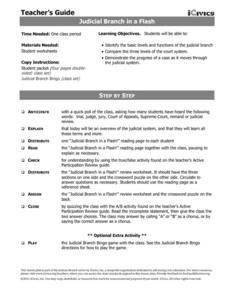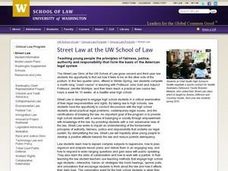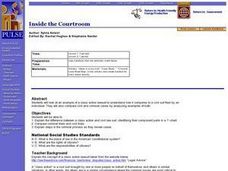School Improvement in Maryland
Court Proceedings Civil Cases
What's the difference between civil and criminal law? How do the court proceedings differ in these two types of trials? How do the standards of proof differ? Why do these differences exist? As part of their examination of the...
Judicial Learning Center
Understanding the Types of Cases
Most young scholars are aware of the criminal courts system, but the United States Constitution allows for a much broader role. What other roles do courts play in settling other questions? A case study and WebQuest-style activities...
Curated OER
Lesson 4: The Judiciary: A Brief Introduction to the Courts System
Focusing on the judicial branch of government, the fourth lesson in this series explores the structure of the US courts system. Beginning with an engaging activity based on the short story The Lady or the Tiger, students go on...
Teaching Tolerance
Racial Disparity in the Criminal Justice System
Explore the impact of the war on drugs in a thought-provoking lesson for high school academics. Young historians delve into the world of the criminal justice system and the racial disparity that occurs in the US. The resource provides...
Curated OER
Government Lesson Plan: Lesson Plan 9
Learners examine and compare/contrast the steps of criminal and civil cases. They define key vocabulary terms, develop an outline of a criminal and civil trial, and analyze the differences in standards of proof in legal cases.
Personal Genetics Education Project
DNA, Crime and Law Enforcement
Civil rights meets biotechnology in a instructional activity that scrutinizes the collection of DNA of citizens who have been arrested, but not yet convicted of a crime. Real-life cases are examined in which the DNA of a relative was...
Curated OER
Civil Rights and the Michigan Supreme Court II
Students view a PowerPoint presentation on the Michigan Supreme Court Historical Society's Civil Rights and/or the Native American Rights. They write a reaction paper and prepare for a class discussion. They work in groups and discuss...
Judicial Learning Center
Judicial Independence: What’s Wrong with This Court?
Why is it important for judges to operate independently of politics or other branches of government? Scholars ponder the question as they examine video clips, case studies, excerpts of the US Constitution, and an interactive computer...
Curated OER
Indiana Courts: How Do They Work?
Students identify the branches of Indiana's judicial system and determine the differences between the different courts and different types of cases. Students create a flow chart showing how a court case works its way through the legal...
Curated OER
Lesson 5: In the Courtroom: Understanding the Players and the Action
Young lawyers put Goldilocks on trial as they develop an understanding of the legal system in the final lesson plan of this five-part series. After learning about key terms relating to litigation, students are assigned roles...
Curated OER
Do We Need a Permanenet International Criminal Court?: War Crimes, Violence, International Law and Politics, Nuremberg
In this lesson, students explore the history, relevance and current application of international tribunals for war crimes. Students look at cases from the Nuremberg trials, Tokyo trials and the Bosnian War.
iCivics
Judicial Branch in a Flash
What is the difference between the federal court and state court systems? What about criminal versus civil cases? Check out this resource that will offer your class members a general and effective overview of the judicial branch in the...
Curated OER
Tort Law
Learners study the concept of negligence. They recognize the difference between civil and criminal law and examine the factors that courts consider when considering if there is a duty and whether it has been breached. They argue either...
Curated OER
Role Playing Free Speech
Learners conduct research into looking at a free-speech issue. They role play the events surrounding a court case. The lesson includes guiding questions to help create context and determine areas of further study. The presentation...
Alabama Learning Exchange
Read All About It! Supreme Court Case Makes Headlines!
Students are assigned a landmark Supreme Court case to research. They construct a one-page newsletter on the case which include a summary of the case, two pictures and a short biography on one of the justices on the Court at that time.
Curated OER
Torts: Intentional Torts
High schoolers are introduced to the concept of intentional torts. In groups, they compare and contrast civil and criminal wrongs committed by people. They are given case studies and use the elements of torts to apply to them. They share...
Curated OER
Justice at the Local Level: Is it Effective?
Students view a PowerPoint presentation on the court system. They are arranged into groups and evaluate the effectiveness of the criminal and civil courts in local Michigan communities.
Curated OER
How Long is Too Long?
Young scholars examine the legal term statute of limitations and how it varies based on the type of criminal or civil activity under discussion. They discern the applicable statute of limitations given an hypothetical or actual situation...
Curated OER
Mediation/Conciliation
Twelfth graders discuss the court system in Japan, and assume roles of family members and friends of air crash victims. They discuss whether they would file suit against airlines, compare methods of achieving justice in United States and...
Curated OER
The Legacy of the Warren Court
Young scholars examine the major decisions by the Supreme Court when Warren was the Chief Justice. In groups, they research the life and other works of Earl Warren and discuss how ones background can influence decisions. They also...
Curated OER
Inside the Courtroom
Twelfth graders explain the difference between a class action and civil law suit. In groups, they compare and contrast criminal and civil trials and review various cases. They determine the place of law in the American constitutional...
Teaching Tolerance
Understanding the Prison Label
Break the chain. An engaging lesson plan examines why it is so hard to break free of the prison system in the US. Academics participate in a reader's theater, read primary sources, and discuss their thoughts. The lesson plan explains the...
Curated OER
Ira Ritter, Et Al., V. Jerry And Ruth Stanton Lesson 2: What Does a Jury Do Anyway?
Young scholars investigate how a jury is chosen, and what the rights and responsibilities of juries are. They examine case studies to determine the role of the jury in both criminal and civil cases.
Curated OER
Tort Law -- Negligence
Students review the differences between criminal and civil law. In groups, they examine high-profile cases and identify any act of negligence. They create a list of the elements of negligence and answer discussion questions as they watch...























